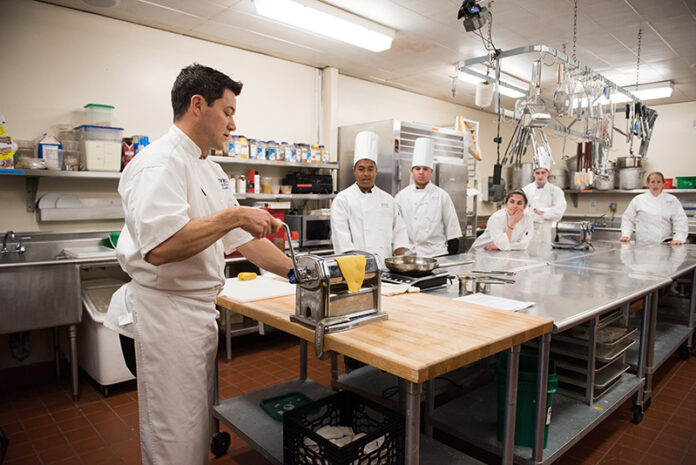Piccata, ganache, pâte à choux — any MVRHS student who’s rotated through the freshman exploratory program can translate these foreign words into food, or at least tell you how they’re prepared. I had to Google all three. The images are mouthwatering — your favorite protein in a sauce of lemon juice, butter, and capers; decadent chocolate drizzle; airy puff pastry — why didn’t I take culinary arts in high school?
I suppose at 14 I wasn’t quite ready for the bustle of the industrial kitchen. I was certainly curious, though. I remember trying to act casual as I slowed to glance through the swinging screen door, looking for the source of the tummy-rumbling smells, and being surprised by the efficiency of my classmates at work slicing, measuring, cleaning, and stirring. It was loud in there — students chattering, machines laboring, Chef O’Malley giving directions, timers beeping. It seemed like a completely different kind of education from the one I was getting.
It turns out, it was. My peers in Career Technical Programs (CTE; formerly called vocational) graduated with tangible, desirable, and immediately hirable skills. For those of you who aren’t familiar with it, the high school offers seven CTE programs; culinary arts, automotive technology, carpentry, maritime studies, horticulture, business and marketing, and health assisting.
Whether students go off to attain higher education or jump right into the workforce to apply their training, this opportunity is not just for the individual, but for the integrity of the Island community. With energetic and inspired high school graduates encouraged to stick around and ply their talents on the Island every year, we cultivate and sustain an increasingly skilled and innovative workforce, made up of Islanders who understand the greater needs and wants of the Island community.
As Jack O’Malley, the CTE department chair and culinary arts teacher, described to me, “We prepare students for jobs that are in demand. The reason we have the CTE classes is because these are the primary jobs on the Island. In the morning, the boat is filled with contractors — we obviously have a need on the Island for people in these skilled professions.”
Two years ago, Kevin Crowell, co-owner of Détente restaurant with his wife Suzanna, joined Jack as a co-teacher to meet the growing student demand for the program. Each chef teaches a period for freshmen, sophomores, and upperclassmen, both bringing extensive experience from restaurants all over the Vineyard into the classroom.
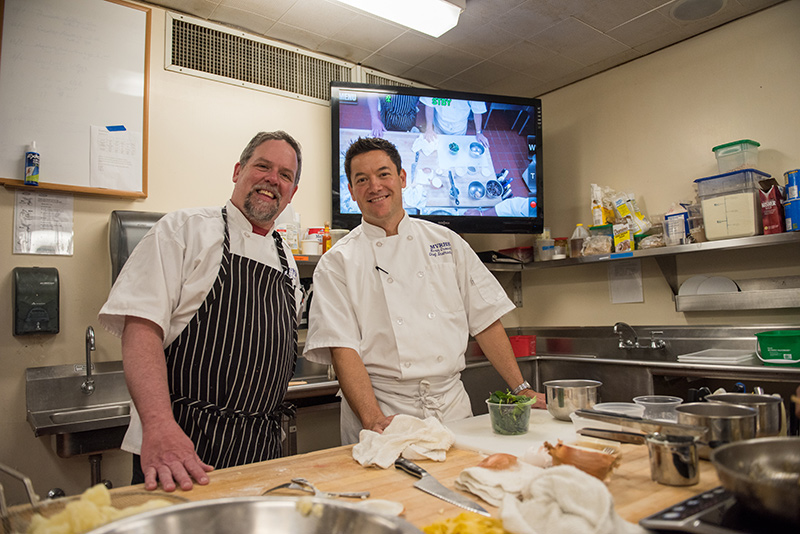
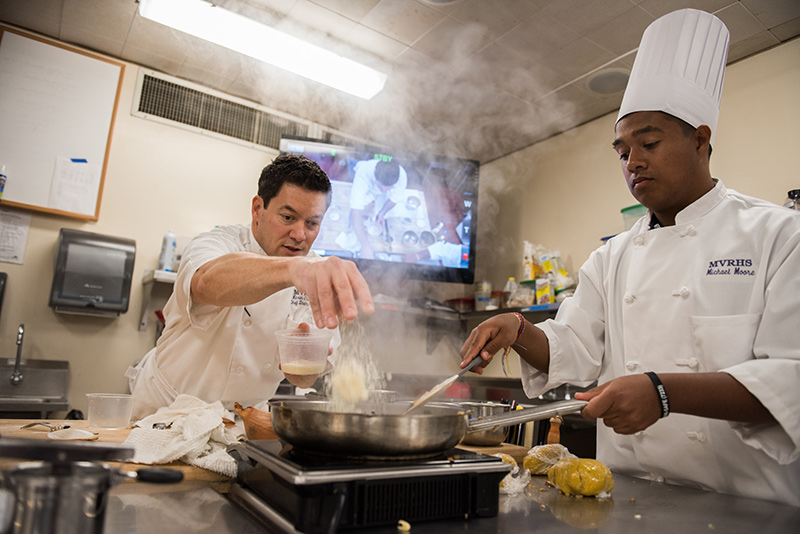
“One of the best things about having access to the culinary department at the high school was practicing important skills during the week,” Aaron Lowe, a graduate of the class of 2014 told me. “A couple of times a week, you hold a knife, think about cooking meats to temp — having that repetition, and being exposed to many different ways of doing things, was really valuable. The other big aspect that I think is underrated is that it’s a safe space. It’s somewhere that’s relaxing. If you’re comfortable being in a kitchen, then it’s way better than being in a study hall.”
Senior year, Aaron had five of his eight periods in the kitchen, as both a student and a teaching assistant. After graduating in 2014, Aaron earned an associate’s degree in culinary arts and a B.A. in food and beverage business management at the New England Culinary Institute. In the time since, he has enjoyed splitting his time between managing the IGI Island Food Rescue Program and working as a private chef.
“I think that knowing a trade is one of the only ways you can make a sustainable living on the Island right now, if you wanted to stay,” Lowe said. On Martha’s Vineyard, “the career fields that you can make money in right now are the trades.”
Brian Dubë is doing just that. Brian graduated from MVRHS in 2006, and currently works as a line cook at Rosewater in Edgartown.Taking culinary arts in high school set Brian up for a summer job at Farm Neck, and afterward, a spot at Johnson and Wales. Of culinary school, Brian told me, “I basically already knew all of the cooking techniques from the MVRHS program and working. Jack is definitely the most influential teacher I’ve ever had in my entire life.”
Warren West — you may know him as the kitchen manager at Edgartown’s new restaurant, Town — skipped straight into the industry after his time in the culinary department. He gave me a good glimpse into the department. “The culinary program wasn’t just the basics. It taught you the flow of everything — as if you were in a restaurant. We used to do teacher lunches — that’s such a great idea — it gave us an opportunity to cook, and an idea of what it’s like in the industry. Jack really did a great job of incorporating that aspect alongside teaching the timing of things and different ways of cooking. We made our own ice creams, breads — it was a really great beginner and intermediate platform for a young individual to jump off from. He gave you those extra couple of steps on the ladder, which really gives you a taste for the industry. It really solidified my deeper passion, which has always been food. And solidified that I was really going to do it.”
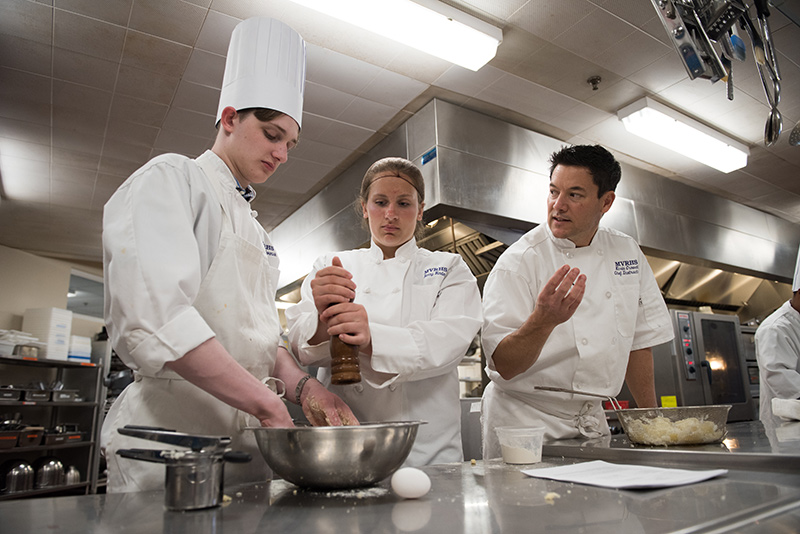
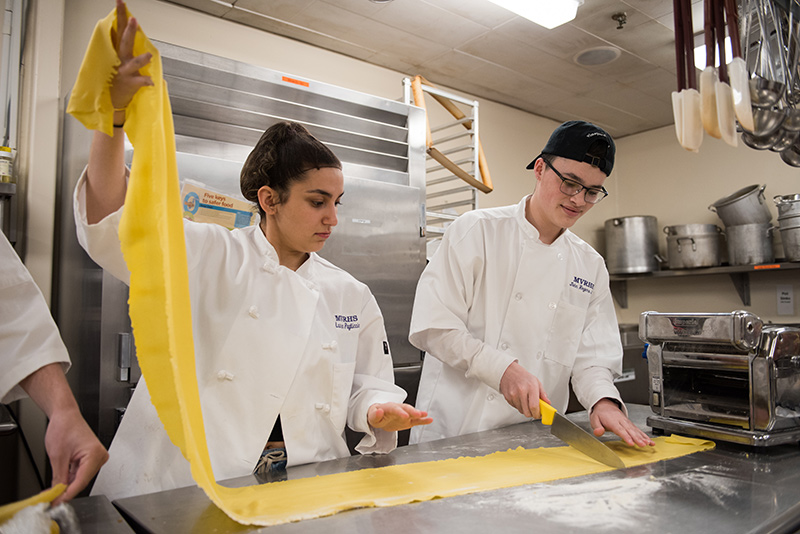
The culinary arts program is also influential and beneficial for students who find passion elsewhere, and don’t ultimately end up in the food industry. Alex Dorr, a longtime beach manager at The Trustees of Reservations, EMT B with Tri-Town Ambulance, and volunteer firefighter at the West Tisbury Fire Department, was one of those students. For him, culinary arts was a great part of high school, and he still employs the skills he learned in his everyday life — when he’s not serving the community in one way or another. In fact, cooking is a big part of fire station culture, and the whole department gets together and cooks a meal at least once a month.
Though he graduated 10 years ago, Alex recalled enjoying “a little bit more freedom than you’d have in a classroom, but still with structure. It allowed you to be creative and do what you wanted to do. It was a really cool environment to be in at the time. We’d work functions together, like the Hinckley’s dinner and meals for the Council on Aging. You felt like you were working in a kitchen with a bunch of friends.” He added, “The structure of the class was really cool — we rotated — one day you might be top chef, the next a prep cook, doing dishes, or you might be serving. It depended on the day. You got to experience everything.” He went on to say, “Jack was honest. He didn’t try to tell you that being a chef was a dream job — it would be hard work with long, late hours. That industry is very demanding, and he was honest. And some of the kids I went to school with in culinary are now really successful in that industry.”
The success of this department is tangible in the food that former students all over the Island — and perhaps the world — make every day, whether in industry or for their friends and family. Aaron still makes the turkey thigh roulade that Jack taught him for his family’s Thanksgiving meal every year.
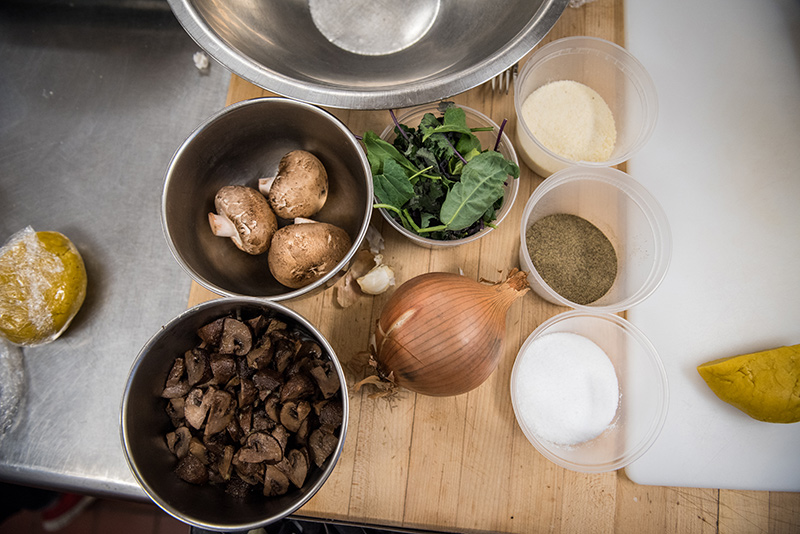
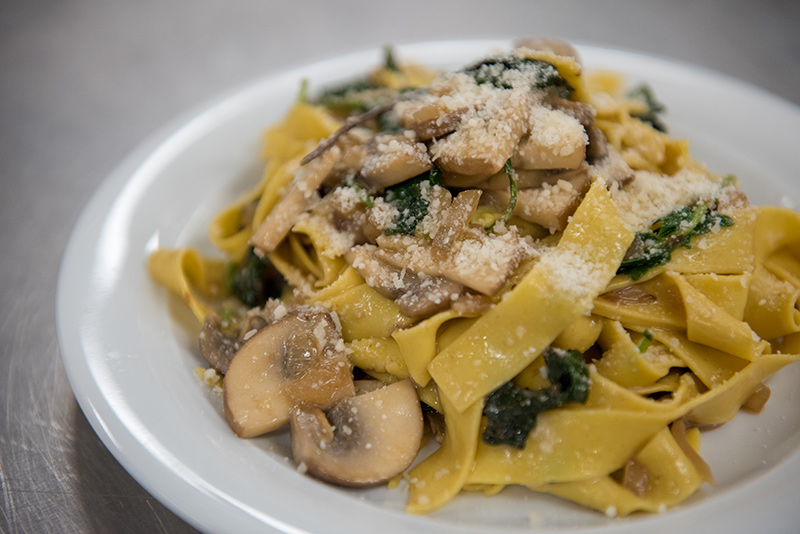
In the 15 years since Jack started at MVRHS, his passion for what he does hasn’t wavered. It shows in the good nature and humor he brings to his work each day, and it sounds as though Kevin’s energy is very similar. When I asked Jack how it felt to share the kitchen, he told me, “I love it. Kevin is a great guy — he’s so talented. He’s very easygoing and easy to work with.”
Coming into the department was an exciting opportunity for Kevin to engage with the community in a new way. He recalled that a few years back, “Island Grown Schools was doing fundraisers for the school gardens. At the time, my wife and I also owned Sweet Life Cafe. So I said, ‘Why don’t we try to do one at a restaurant, and get the kids out of school for a change?’ I went out and foraged some things, and people donated things from around the Island — we made stinging nettle cavatelli and beef ragu from short ribs from the FARM Institute.”
He went on, “One thing led to another. I heard rumors that the culinary department was a popular program and that they might need to increase the number of classes offered, so I started getting my certifications, and when the job came up, I applied.”
Now, Kevin’s got big plans for the cafeteria.
Kevin seems to be a realistic visionary with a “there’s no such thing as too much of a good thing” mindset. As he nears the end of his second year working alongside Jack in the culinary department and running Détente, he is also hatching some big plans as he helps to oversee the cafeteria’s transition to in-house food preparation. This spring saw the last of the off-Island-based industrial food corporation that has been supplying the cafeteria, and the new school year will welcome in Island chefs cooking National School Lunch Program–approved meals from scratch.
When I asked him about what to expect from a gourmet chef in a high school cafeteria, he said, “the No. 1 goal is to feed the kids. You can definitely be creative, though you have to be creative under the budgetary constraints, which is pretty limiting.”
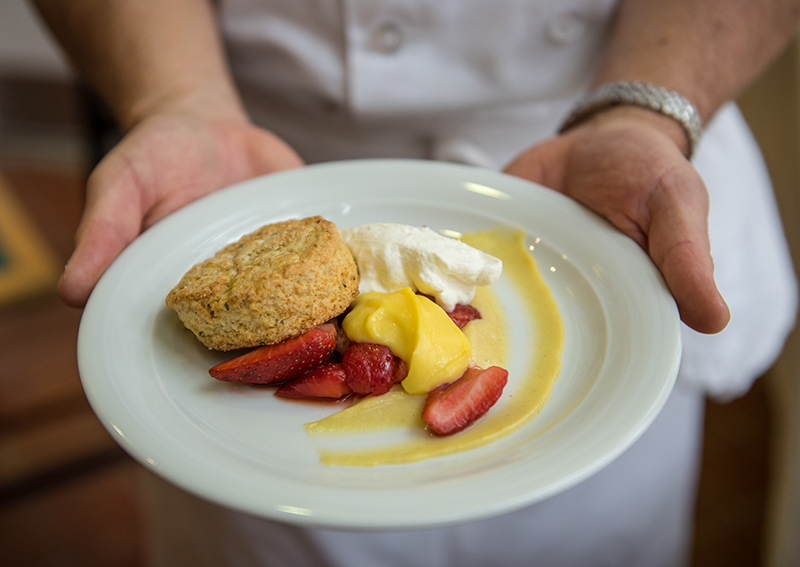
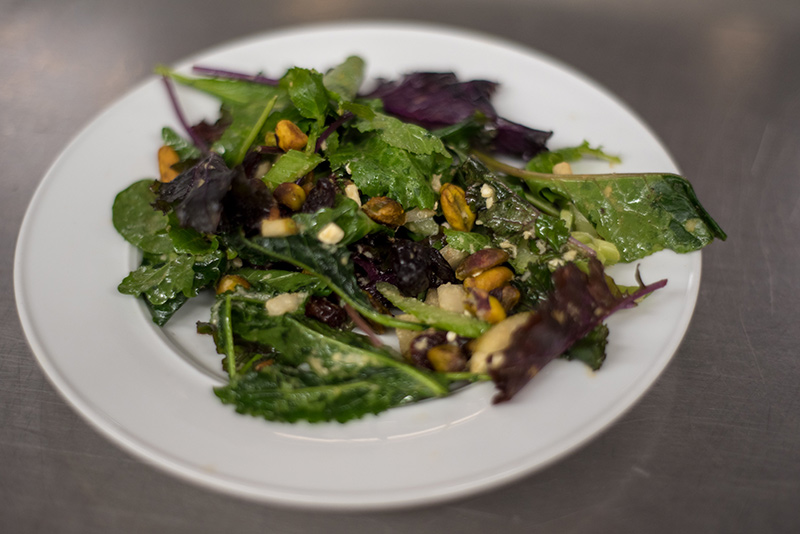
He also spoke to the necessity for a range of offerings. “There are kids that have more adventurous palates, and there are kids where this might be their one big meal for the day, so you have to take a step back, and you have to hit the mark. The hard part is finding the balance of trying to have nutrient-rich, wholesome food, and at the same point, kids should be able to choose what they want to eat and enjoy it. There’s nothing wrong with a good pizza or burger, but I don’t think that our program should revolve around that. I am always amazed by how the students gravitate toward the salad bar.”
It’s common knowledge that well-fed students are happier students, and as anyone who has ever dined at Détente will tell you, if Kevin’s behind it, it’s good.
While the program is presently in the planning phases, Kevin is looking forward to developing synergy with Island Grown Schools’ onsite garden, the garden club, the horticulture department, and potentially the Island Grown Initiative’s gleaning program, so that in some cases students may be eating ingredients they’ve helped to cultivate, harvest, and of course, prepare. It seems sustainable, wholesome, and about as locally sourced as it gets. Kevin also hopes to eventually provide culinary students the opportunity to work in the cafeteria through the work-study program. As he put it, “It’s the purpose of the lunch program to mesh with other programs. If you’re harvesting and you need a spot for the food to go, we could help with that. Everyone is teaching. If these programs can mesh together in a nice, clean way, and everyone can benefit from it — that’s the goal.”

